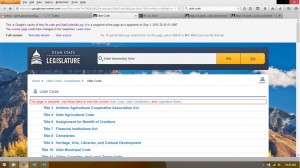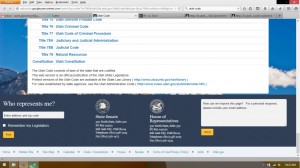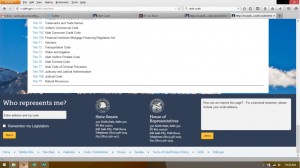Activity Summary – Week Two
Made it to Friday of my first full week of work! Yay me! So what have I done this week?
I made it through the first pass of reviewing all 50 states (and DC) online codes. My goal was to have all of the state code data collection project done this week, so I’m pretty much on schedule. Yay me.* About halfway through I decided I needed to have separate entries for the actual name of the code and the name of the official/certified version of the code. (Because they’re not the same thing. Of course they’re not.) I hope to fill that in, as well as a few unknowns in my datasheet by the end of business today. That means I get to spend today in the Harvard Law Library Reading Room using the AALL State Bibliographies, which will hopefully help solve some mysteries for me.
After I get everything sorted I’ll make it all public. I really want to jump into the data collection on case law, so any in depth analysis of the code information will probably wait. I can say now that one way my thinking has changed is that – for some reason – I used to think that only state websites could/should be the publisher of official digital copies of law. However, something about seeing the number of privately published print official/certified codes has caused me to change my mind. Why can’t a State Decoded website be certified too?
(I have vague ideas about how blockchain technology could be implemented ensure absolute accuracy and chain of custody with regards to code data without relying upon PDFs. But that’s another post for another day. And I’m sure they’re are other ways of doing this. Hey hey, who’s got a research project and a couple of months to spare doing research? This gal right here. But I digress.)
Speaking of AALL, I was reminded this week of the Digital Access to Legal Information Committee. They are the ones in charge of the 50 state surveys, which I am modelling my data collection on. Yay for more people being interested in this type of information and future possible collaborators.
*It’s interesting being in charge of my own schedule and deadlines. I like it. Surprisingly, no guilt thus far about not working hard enough or fear about setting the bar too low. I think maybe because it wasn’t that long ago that getting out of bed and getting dressed consisted of a victory for me that I’m in no rush to set myself up for failure.
Speaking of success, the Berkman stuff will finally start to ramp up next week. There was an email chain of all the new/returning fellows/affiliates/associates etc introducing themselves. Holy Impressive Lineup, Batman. I was hit with a mixture of impostor syndrome and “I don’t think we’re in Kansas anymore, Toto.” My parents like to kid me about being a librarian rockstar, but there are like, actual rockstars on this list. And, oh, by the way, US Supreme Court justice coming to talk to us. It’s intimidating and exciting and I can’t wait to learn more from the community. I’m still not entirely sure how I am lucky enough to be doing this.
On the skills enhancement side of things, I started to work my way through the Code Academy web stuff. All refresher thus far and pretty easy. I was told by several people, quite understandably, that instead of asking what programming language I should learn, I should have a project in mind and build it and that will teach me what language to learn. But that doesn’t quite answer the question about which language will do what I want – I don’t want to start building something in, say, Ruby, only to find that actually Python would have been better. Does taht make sense? At any rate, I think I’m going to start with the python modules on code academy.
I also want to highlight this blog post I read this week: Libraries’ Tech Pipeline Problem. Definitely reinforced my thinking that I have a great opportunity here to teach myself some new technical skills.
On a personal note, settling into Cambridge nicely. My apartment – a small fully furnished one – is finally starting to feel a little like home/my space, even though I’m surrounded by other people’s stuff. I’m also starting to get some routines in place, which are always comforting. I’m definitely learning to embrace simplicity, just due to the size of my apartment and the fact that I couldn’t bring much stuff with me. It’s nice. I guess I could insert a reference to local boy Thoreau here, but I’ll pass on the temptation. My plan for the weekend is to get the heck out of Boston one day – probably Salem because I know I definitely want to see that and soon it’ll be too close to Halloween to deal with – and maybe one day go down town and ride a double decker bus tour just to get the lay of the land. I’ve been to Boston quite a few times in the past few years, but it seems like all I saw was either the convention center or Harvard Law School.


